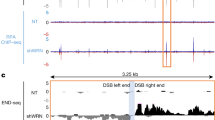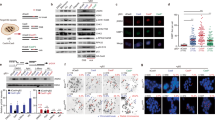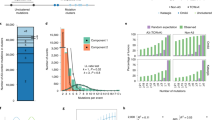Abstract
Deficiencies in DNA mismatch repair (MMR) result in replication errors within key tumor suppressor genes or oncogenes, and cause hereditary nonpolyposis colorectal cancer (HNPCC). Hematological malignancy with microsatellite instability is also associated with defective MMR, but little is known about the target genes for MMR. Here we identified Ikaros, a master transcription factor of lymphoid lineage commitment and differentiation, as a mutational target in spontaneous and radiation-induced T-cell lymphomas in Mlh1-deficient mice. Three quarters of lymphomas lacked Ikaros protein expression, which resulted from a frameshift mutation that created a stop codon. Mononucleotide repeat sequences at 1029–1034(C)6 and 1567–1572(G)6 in Ikaros were mutational hot spots with a one-base deletion occurring with a frequency of 45 and 50%, respectively. Point mutations and splicing alterations were also observed. In total, 85% of the lymphomas showed aberrations in Ikaros. The characteristic of Mlh1-deficient lymphomas is harboring of multiple mutations simultaneously in the same tumor, displaying a combination of two frameshift mutations at different repeats, frameshift and point mutations, and/or deletion mutations. This is the first report of Ikaros mutations coupled with Mlh1 deficiency in lymphomagenesis.
This is a preview of subscription content, access via your institution
Access options
Subscribe to this journal
Receive 50 print issues and online access
$259.00 per year
only $5.18 per issue
Buy this article
- Purchase on Springer Link
- Instant access to full article PDF
Prices may be subject to local taxes which are calculated during checkout


Similar content being viewed by others
References
Baker SM, Plug AW, Prolla TA, Bronner CE, Harris AC, Yao X et al. (1996). Involvement of mouse Mlh1 in DNA mismatch repair and meiotic crossing over. Nat Genet 13: 336–342.
Baross-Francis A, Makhani N, Liskay RM, Jirik FR . (2001). Elevated mutant frequencies and increased C: G → T: A transitions in Mlh1−/− versus Pms2−/− murine small intestinal epithelial cells. Oncogene 20: 619–625.
Bronner CE, Baker SM, Morrison PT, Warren G, Smith LG, Lescoe MK et al. (1994). Mutation in the DNA mismatch repair gene homologue hMLH1 is associated with hereditary non-polyposis colon cancer. Nature 368: 258–261.
Campbell MR, Thang TY, Jirik FR, Andrew SE . (2000). Candidate mutator genes in mismatch repair-deficient thymic lymphomas: no evidence of mutations in the DNA polymerase delta gene. Carcinogenesis 21: 2281–2285.
De Vos M, Hayward BE, Charlton R, Taylor GR, Glaser AW, Picton S et al. (2006). PMS2 mutations in childhood cancer. J Natl Cancer Inst 98: 358–361.
Duval A, Hamelin R . (2002). Mutations at coding repeat sequences in mismatch repair-deficient human cancers: toward a new concept of target genes for instability. Cancer Res 62: 2447–2454.
Fishel R, Lescoe MK, Rao MR, Copeland NG, Jenkins NA, Garber J et al. (1993). The human mutator gene homolog MSH2 and its association with hereditary nonpolyposis colon cancer. Cell 75: 1027–1038.
Georgopoulos K, Moore DD, Derfler B . (1992). Ikaros, an early lymphoid-specific transcription factor and a putative mediator for T cell commitment. Science 258: 808–812.
Gu L, Cline-Brown B, Zhang F, Qiu L, Li GM . (2002). Mismatch repair deficiency in hematological malignancies with microsatellite instability. Oncogene 21: 5758–5764.
Kabbarah O, Mallon MA, Pfeifer JD, Edelmann W, Kucherlapati R, Goodfellow PJ . (2003). A panel of repeat markers for detection of microsatellite instability in murine tumors. Mol Carcinogen 38: 155–159.
Kakinuma S, Nishimura M, Kubo A, Nagai JY, Amasaki Y, Majima HJ et al. (2005). Frequent retention of heterozygosity for point mutations in p53 and Ikaros in N-ethyl-N-nitrosourea-induced mouse thymic lymphomas. Mutat Res 572: 132–141.
Kakinuma S, Nishimura M, Sasanuma S, Mita K, Suzuki G, Katsura Y et al. (2002). Spectrum of Znfn1a1 (Ikaros) inactivation and its association with loss of heterozygosity in radiogenic T-cell lymphomas in susceptible B6C3F1 mice. Radiat Res 157: 331–340.
Karlsson A, Soderkvist P, Zhuang SM . (2002). Point mutations and deletions in the znfn1a1/ikaros gene in chemically induced murine lymphomas. Cancer Res 62: 2650–2653.
Leach FS, Nicolaides NC, Papadopoulos N, Liu B, Jen J, Parsons R et al. (1993). Mutations of a mutS homolog in hereditary nonpolyposis colorectal cancer. Cell 75: 1215–1225.
Lowsky R, Magliocco A, Ichinohasama R, Reitmair A, Scott S, Henry M et al. (2000). MSH2-deficient murine lymphomas harbor insertion/deletion mutations in the transforming growth factor beta receptor type 2 gene and display low not high frequency microsatellite instability. Blood 95: 1767–1772.
Nakanishi M, Tanaka K, Takahashi T, Kyo T, Dohy H, Fujiwara M et al. (2001). Microsatellite instability in acute myelocytic leukaemia developed from A-bomb survivors. Int J Radiat Biol 77: 687–694.
Nakayama H, Ishimaru F, Avitahl N, Sezaki N, Fujii N, Nakase K et al. (1999). Decreases in Ikaros activity correlate with blast crisis in patients with chronic myelogenous leukemia. Cancer Res 59: 3931–3934.
Okano H, Saito Y, Miyazawa T, Shinbo T, Chou D, Kosugi S et al. (1999). Homozygous deletions and point mutations of the Ikaros gene in gamma-ray-induced mouse thymic lymphomas. Oncogene 18: 6677–6683.
Papadopoulos N, Nicolaides NC, Wei YF, Ruben SM, Carter KC, Rosen CA et al. (1994). Mutation of a mutL homolog in hereditary colon cancer. Science 263: 1625–1629.
Papathanasiou P, Perkins AC, Cobb BS, Ferrini R, Sridharan R, Hoyne GF et al. (2003). Widespread failure of hematolymphoid differentiation caused by a recessive niche-filling allele of the Ikaros transcription factor. Immunity 19: 131–144.
Parsons R, Li GM, Longley MJ, Fang WH, Papadopoulos N, Jen J et al. (1993). Hypermutability and mismatch repair deficiency in RER+ tumor cells. Cell 75: 1227–1236.
Reitmair AH, Schmits R, Ewel A, Bapat B, Redston M, Mitri A et al. (1995). MSH2 deficient mice are viable and susceptible to lymphoid tumours. Nat Genet 11: 64–70.
Ricciardone MD, Ozcelik T, Cevher B, Ozdag H, Tuncer M, Gurgey A et al. (1999). Human MLH1 deficiency predisposes to hematological malignancy and neurofibromatosis type 1. Cancer Res 59: 290–293.
Shimada Y, Nishimura M, Kakinuma S, Ogiu T, Fujimoto H, Kubo A et al. (2003). Genetic susceptibility to thymic lymphomas and K-ras gene mutation in mice after exposure to X-rays and N-ethyl-N-nitrosourea. Int J Radiat Biol 79: 423–430.
Shimada Y, Nishimura M, Kakinuma S, Okumoto M, Shiroishi T, Clifton KH et al. (2000). Radiation-associated loss of heterozygosity at the Znfn1a1 (Ikaros) locus on chromosome 11 in murine thymic lymphomas. Radiat Res 154: 293–300.
Sun L, Crotty ML, Sensel M, Sather H, Navara C, Nachman J et al. (1999a). Expression of dominant-negative Ikaros isoforms in T-cell acute lymphoblastic leukemia. Clin Cancer Res 5: 2112–2120.
Sun L, Heerema N, Crotty L, Wu X, Navara C, Vassilev A et al. (1999b). Expression of dominant-negative and mutant isoforms of the antileukemic transcription factor Ikaros in infant acute lymphoblastic leukemia. Proc Natl Acad Sci USA 96: 680–685.
Tokairin Y, Kakinuma S, Arai M, Nishimura M, Okamoto M, Ito E et al. (2006). Accelerated growth of intestinal tumours after radiation exposure in Mlh1-knockout mice: evaluation of the late effect of radiation on a mouse model of HNPCC. Int J Exp Pathol 87: 89–99.
Wang JH, Nichogiannopoulou A, Wu L, Sun L, Sharpe AH, Bigby M et al. (1996). Selective defects in the development of the fetal and adult lymphoid system in mice with an Ikaros null mutation. Immunity 5: 537–549.
Wang Q, Desseigne F, Lasset C, Saurin JC, Navarro C, Yagci T et al. (1997). Germline hMSH2 and hMLH1 gene mutations in incomplete HNPCC families. Int J Cancer 73: 831–836.
Winandy S, Wu P, Georgopoulos K . (1995). A dominant mutation in the Ikaros gene leads to rapid development of leukemia and lymphoma. Cell 83: 289–299.
Woerner SM, Kloor M, Mueller A, Rueschoff J, Friedrichs N, Buettner R et al. (2005). Microsatellite instability of selective target genes in HNPCC-associated colon adenomas. Oncogene 24: 2525–2535.
Yao X, Buermeyer AB, Narayanan L, Tran D, Baker SM, Prolla TA et al. (1999). Different mutator phenotypes in Mlh1- versus Pms2-deficient mice. Proc Natl Acad Sci USA 96: 6850–6855.
Acknowledgements
We gratefully acknowledge Dr Michael Liskay (Department of Molecular and Medical Genetics, Oregon Health Sciences University, Oregon, USA) for providing the Mlh1-knockout mice and for the helpful comments on the manuscript. We thank Mizuho Igo and Eriko Obara for technical assistance, and the Division of Animal Facility staff for helps with laboratory analysis and animal maintenance. This study was supported partly by a grant-in-aid from the Ministry of Education, Culture, Sports, Science, and Technology of Japan, a grant of ‘Ground-based Research Announcement for Space Utilization’ promoted by the Japan Space Forum and a grant from the Long-range Research Initiative of the Japan Chemical Industry Association.
Author information
Authors and Affiliations
Corresponding author
Additional information
Supplementary Information accompanies the paper on the Oncogene website (http://www.nature.com/onc).
Supplementary information
Rights and permissions
About this article
Cite this article
Kakinuma, S., Kodama, Y., Amasaki, Y. et al. Ikaros is a mutational target for lymphomagenesis in Mlh1-deficient mice. Oncogene 26, 2945–2949 (2007). https://doi.org/10.1038/sj.onc.1210100
Received:
Revised:
Accepted:
Published:
Issue Date:
DOI: https://doi.org/10.1038/sj.onc.1210100



